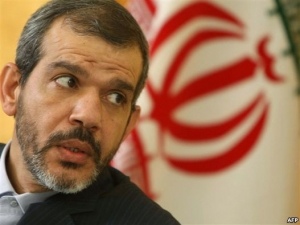 BAGHDAD: The United States has nothing left to pressure Tehran over its nuclear programme except for war, and if it chooses conflict Iran could close a key energy chokepoint, its envoy to Baghdad told AFP on Thursday.
BAGHDAD: The United States has nothing left to pressure Tehran over its nuclear programme except for war, and if it chooses conflict Iran could close a key energy chokepoint, its envoy to Baghdad told AFP on Thursday.
Ambassador Hassan Danaie-Far insisted in an interview that Tehran retained the right to close the Strait of Hormuz, through which a third of the world's traded oil passes, in response to any aggression, military or otherwise.
"What else (US President Barack) Mr. Obama can do?" Danaie-Far said through an Iranian embassy translator.
"The only remaining card on the table is war. Is it to their benefit? Is it to the benefit of the world? Is it to the benefit of the region?"
The diplomat said that if it faced a "problem," Tehran would be within its rights "to react and to defend itself."
Asked if it could try to close off the strait, Danaie-Far replied: "If there is some movement and action from our enemies, including US, against us, as a part of natural reaction, that may happen."
"Everybody would be a loser in that case," he added.
On whether only military or other types of pressure could spur Iran to make such a move, he said: "It can include all of them."
Iran frequently conducts missile tests and manoeuvres to underline its military muscle, and has repeatedly threatened to close the Strait of Hormuz to oil tanker traffic should it be attacked.
Washington has warned Tehran that any attempt to close the strait would be viewed as a "red line" -- grounds for US military action.
Iran regularly denounces the regional presence of foreign forces, including American, particularly those stationed in the Gulf. It says the security of the region must be ensured "by regional countries."
Arab monarchies across the Gulf from Iran are worried by what they see as the territorial ambitions by Islamic republic, which frequently stresses Persia's historic dominance over the waterway.
By The Daily Star
The Iran Project is not responsible for the content of quoted articles.

 QR code
QR code